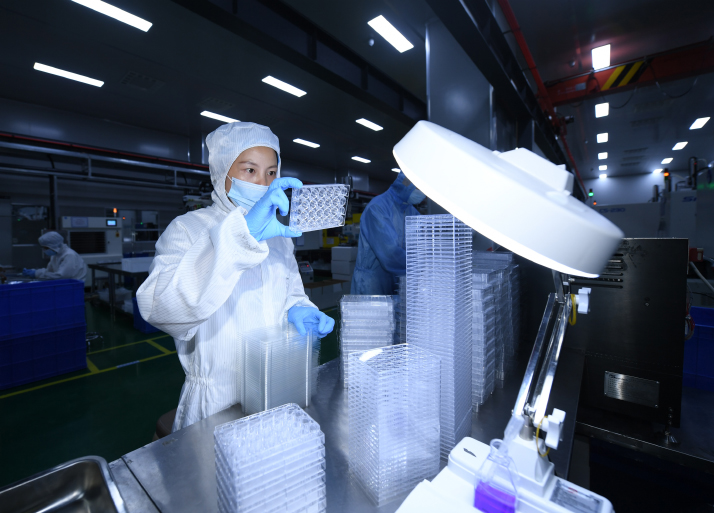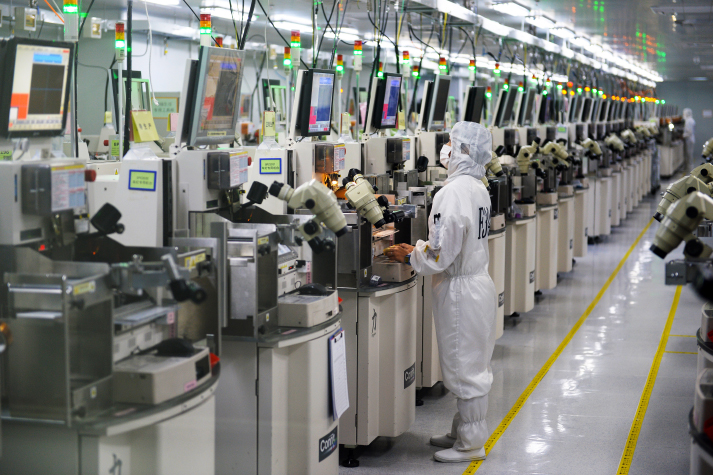| Business |
| Novel approaches are essential to high-quality development | |
| High-quality development relies on innovation and high-quality development is innovation-driven | |
|
|
 A technician performs quality control on the production line of a biotechnology company in Xianju County, Zhejiang Province, on July 4 (XINHUA)
Engaged in original research on life science-related subjects, the Beijing-based National Institute of Biological Sciences (NIBS) has adopted a management system compliant with international conventions. Each of the institute's 28 laboratories is overseen by a director who has final say on research topics and is hired through a global recruitment process. The directors are required to submit work reports every five years in the first decade after they assumed office, which will go through an international peer review process. Only those directors whose projects are recognized as "internationally renowned" in the first stage and "internationally advanced" in the second stage will receive tenure. The way in which NIBS laboratories operate, including their abandoning of awards-oriented assessment standards, is typical of the reforms within China's scientific and research system. Authorities hope the new measures will help foster a more enabling environment for innovation. In recent years, China has attached increasing importance to innovation. The report to the 20th National Congress of the Communist Party of China in October 2022, which outlines the country's development priorities for the next five years and beyond, underscores cultivating an internationalized environment for research and creating an open and globally competitive innovation ecosystem. "High-quality development relies on innovation and high-quality development is innovation-driven," Bi Jingquan, Executive Vice Chairman of the China Center for International Economic Exchanges, said at a forum on high-quality development and Chinese modernization in Beijing on June 28.  A worker operates LED lighting equipment at an intelligent workshop of a photoelectricity company in Quanzhou, Fujian Province, on June 16 (XINHUA)
Basic research "As China is shifting from high-speed growth to high-quality development, our competitiveness lies in the capacity of innovation, and that capacity is created by basic research," Wu Sa, Deputy Director of the Institute of Economics at the Chinese Academy of Macroeconomic Research, said at the event. "We cannot put our efforts on the application side alone but fall behind on basic research." According to an article in Beijing Daily by Liu Qiao, President of the Guanghua School of Management at Peking University, in 2022, China's research spending surpassed 3 trillion yuan ($415.9 billion) for the first time, which was 2.55 percent of its GDP. This investment was in line with the average level of industrialized countries; however, spending on basic research accounted for only 6.32 percent. Basic research usually accounts for more than 12 percent of total research spending in developed Western countries. In 2022, it was 17.2 percent in the United States and 25 percent in France. Liu made a calculation in his article: Research spending accounts for 3 percent of the U.S. GDP and since its basic research input occupies around 17-18 percent of the total, the figure is five times that of China's input. Wu stressed that Western countries' success in creating new technologies such as the metaverse, blockchain and ChatGPT should be attributed to their persistent investment in the projects for many years. He suggested China strengthen basic research such as in physics, chemistry and mathematics. Bi also considers increasing basic research as one of the approaches to nurturing a better innovation ecosystem, suggesting highlighting the role of originality and freedom of exploration. He also underscored the importance of improving incentive mechanisms for researchers, breaking down institutional barriers and strengthening intellectual property rights protection. "It is of vital significance to allow scientists to share in the proceeds of the commercialization of their research findings. This policy will greatly motivate them to employ their intelligence and wisdom, and provide continuous vitality for transforming China into an innovative country," Bi said. China's incentive mechanisms for sci-tech personnel have improved consistently. In 2015, scientific researchers sharing the benefits of the commercialization of their research findings was made law for the first time. The State Council then released regulations in 2016, stipulating those researchers who have made major contributions to a sci-tech achievement should receive no less than 50 percent of the total bonuses awarded to all participants. In 2021, the government further clarified that researchers working on publicly funded projects are also eligible to receive proceeds generated by resulting intellectual property. Wu agreed that researchers are of core importance to innovation. "To make key breakthroughs in basic research, we cannot resort to a huge-crowd strategy. What we need are top-notch scientists," he said. Deep pockets Gleevec, a remarkable drug for leukemia treatment, was developed at the beginning of the century. However, its pharmacology was first described by a biologist in a thesis in the 1950s. It took over 50 years to turn a theory into a useful medicine. Tian Xuan, Associate Dean and Chair Professor of Finance at Tsinghua University's PBC School of Finance, raised this example on the sidelines of the forum on June 29 to illustrate that innovation has a long cycle. In addition, he detailed the two other features of innovation: high uncertainty and high failure rates. Tian said these features mean that innovation requires patience from researchers, as well as investors, which he called "a tolerant financial market." He said such a market has five characteristics: high tolerance of failure, long-term institutional investors, infrequent information disclosure, a more open capital market and more stable macro policies. He compared the duration of Chinese and American venture capital funds, saying that funding in the U.S. usually lasts for 10 to 12 years, while in China it was three to five years and is now extending to five to seven years. The shorter funding duration means venture capitalists tend to finance the projects that have developed for a certain period and already have clear business models. However, if the funding duration is longer, the funds can support projects that are still in their preliminary stages, which allows the entrepreneurs to take risks and keep innovating. Therefore, Tian called for providing startups with long-term capital support, which he said could help the researchers continue their work when they meet obstacles and unlock their potential for innovation. A strong research workforce and sufficient capital are essential to an enabling ecosystem for new ideas and new findings. Apart from these, Wan Zhe, a professor and researcher at the Belt and Road School at Beijing Normal University, said at the forum on June 29 that history has proved that competition is a source of innovation. She said she believes that in the future, China will face fiercer international competition in innovation sectors, but competition and cooperation are interwoven with each other, and the country is open to becoming part of international programs. Wu said he believes China's sci-tech self-reliance indicates that the country will play a significant role in the new round of industrial revolution and contribute its wisdom to global sci-tech progress. BR (Print Edition: Ecosystem of Innovation) Copyedited by G.P. Wilson Comments to zhangshsh@cicgamericas.com |
|
||||||||||||||||||||||||||||
|